牛津译林版形容词、副词专题学案(有答案)
文档属性
| 名称 | 牛津译林版形容词、副词专题学案(有答案) | 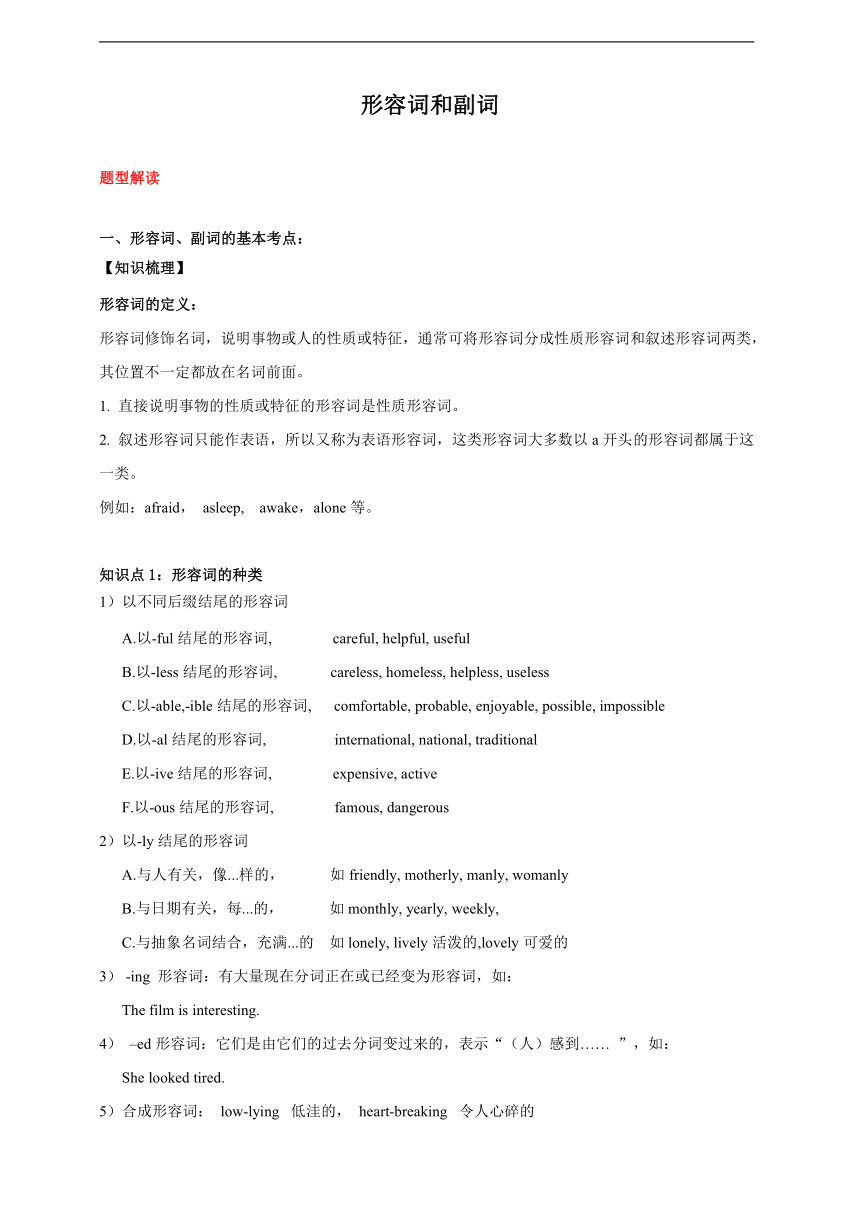 | |
| 格式 | zip | ||
| 文件大小 | 156.5KB | ||
| 资源类型 | 教案 | ||
| 版本资源 | 牛津译林版 | ||
| 科目 | 英语 | ||
| 更新时间 | 2018-11-06 17:55:07 | ||
图片预览

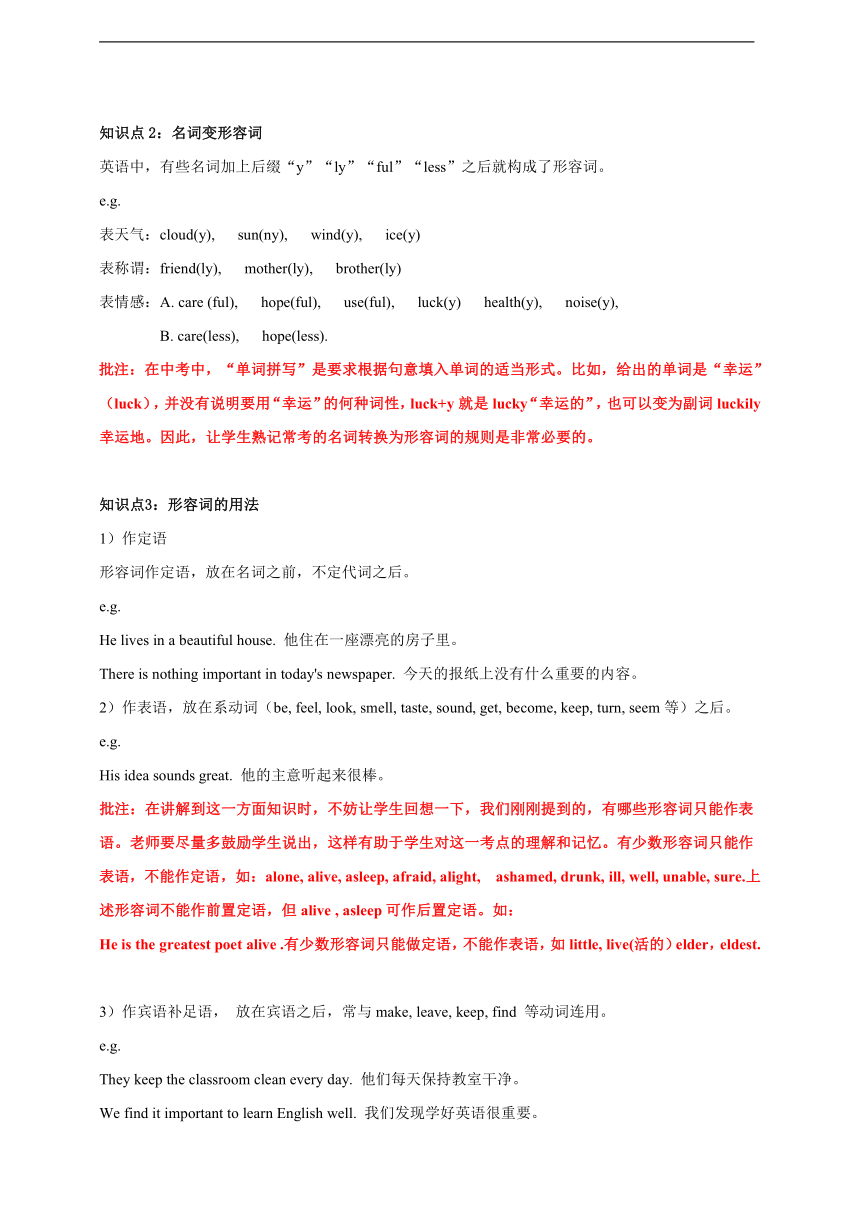
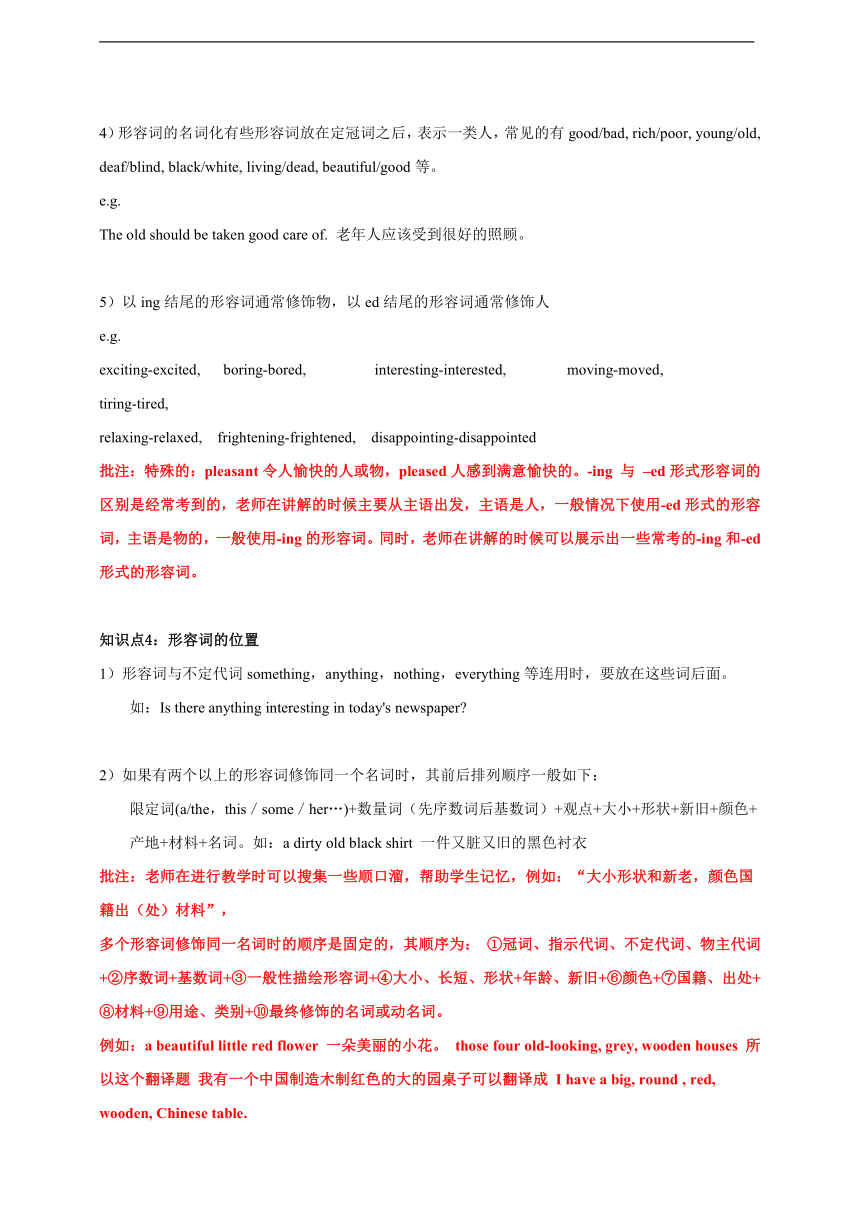
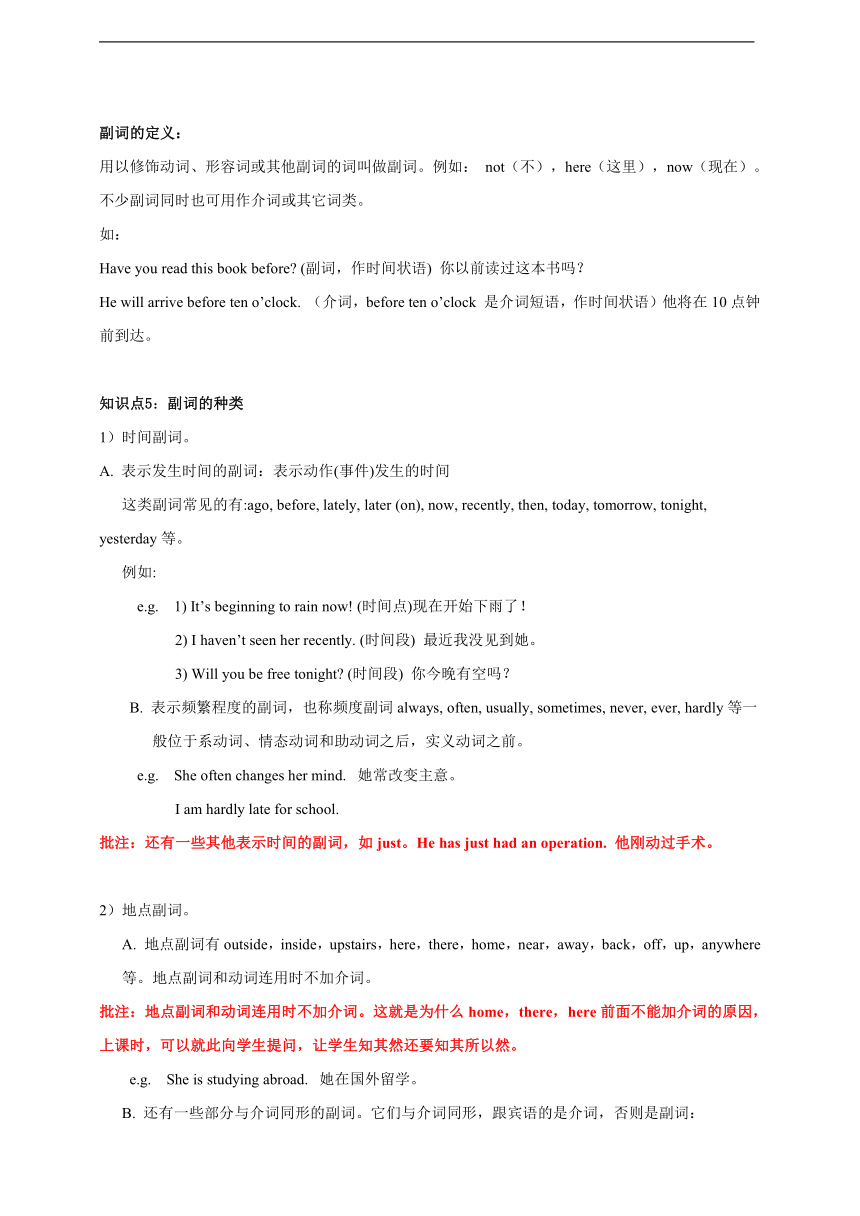
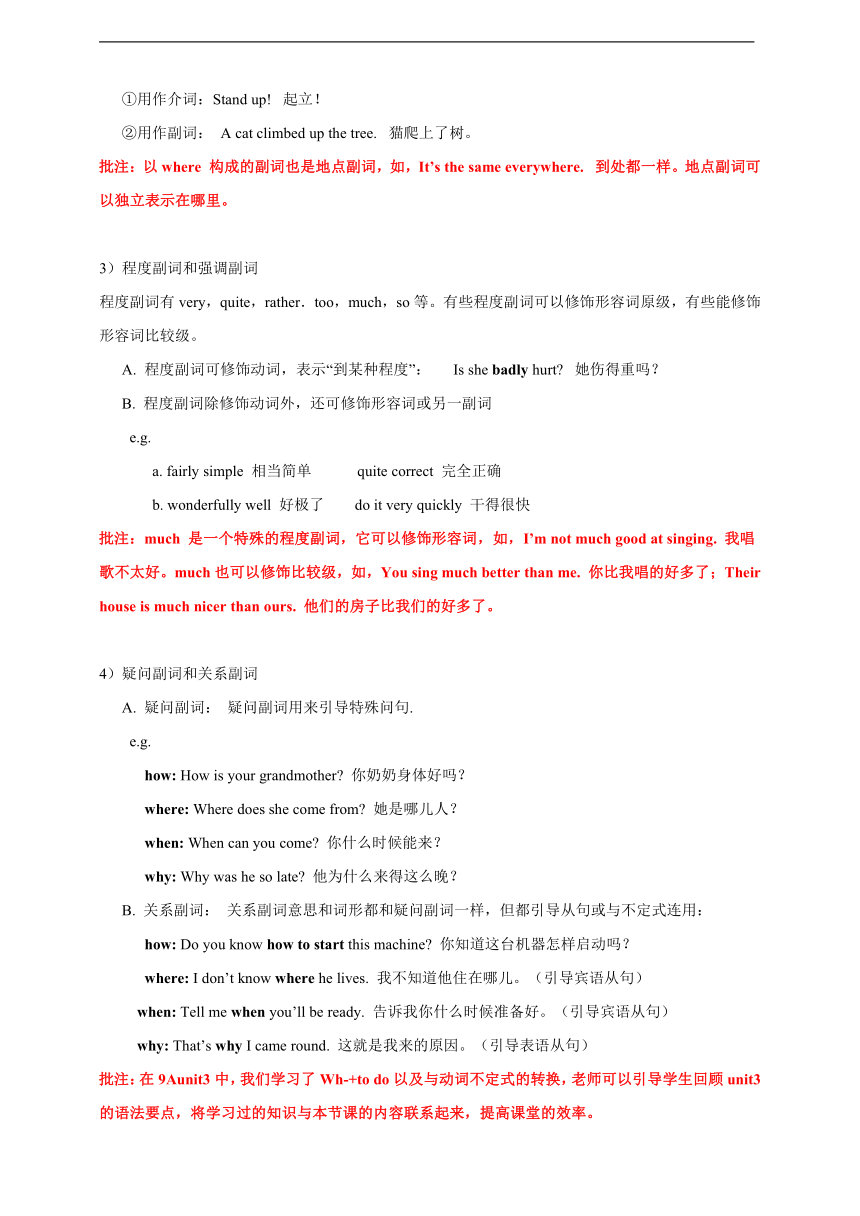
文档简介
形容词和副词
题型解读
一、形容词、副词的基本考点:
【知识梳理】
形容词的定义:
形容词修饰名词,说明事物或人的性质或特征,通常可将形容词分成性质形容词和叙述形容词两类,其位置不一定都放在名词前面。
1. 直接说明事物的性质或特征的形容词是性质形容词。
2. 叙述形容词只能作表语,所以又称为表语形容词,这类形容词大多数以a开头的形容词都属于这一类。
例如:afraid, asleep, awake,alone等。??
知识点1:形容词的种类
1)以不同后缀结尾的形容词
A.以-ful结尾的形容词, careful, helpful, useful
B.以-less结尾的形容词, careless, homeless, helpless, useless
C.以-able,-ible结尾的形容词, comfortable, probable, enjoyable, possible, impossible
D.以-al结尾的形容词, international, national, traditional
E.以-ive结尾的形容词, expensive, active
F.以-ous结尾的形容词, famous, dangerous
2)以-ly结尾的形容词
A.与人有关,像...样的, 如friendly, motherly, manly, womanly
B.与日期有关,每...的, 如monthly, yearly, weekly,
C.与抽象名词结合,充满...的 如lonely, lively活泼的,lovely可爱的
3)?-ing 形容词:有大量现在分词正在或已经变为形容词,如:
The film is interesting.
4) –ed形容词:它们是由它们的过去分词变过来的,表示“(人)感到…… ”,如:
???? She looked tired.
5)合成形容词: low-lying? 低洼的, heart-breaking? 令人心碎的
知识点2:名词变形容词
英语中,有些名词加上后缀“y”“ly”“ful”“less”之后就构成了形容词。
e.g.
表天气:cloud(y), sun(ny), wind(y), ice(y)?
表称谓:friend(ly), mother(ly), brother(ly)??
表情感:A. care (ful), hope(ful), use(ful), luck(y) health(y), noise(y),
B. care(less), hope(less).
批注:在中考中,“单词拼写”是要求根据句意填入单词的适当形式。比如,给出的单词是“幸运”(luck),并没有说明要用“幸运”的何种词性,luck+y就是lucky“幸运的”,也可以变为副词luckily幸运地。因此,让学生熟记常考的名词转换为形容词的规则是非常必要的。
知识点3:形容词的用法
1)作定语
形容词作定语,放在名词之前,不定代词之后。
e.g.
He lives in a beautiful house. 他住在一座漂亮的房子里。
There is nothing important in today's newspaper. 今天的报纸上没有什么重要的内容。
2)作表语,放在系动词(be, feel, look, smell, taste, sound, get, become, keep, turn, seem等)之后。
e.g.
His idea sounds great. 他的主意听起来很棒。
批注:在讲解到这一方面知识时,不妨让学生回想一下,我们刚刚提到的,有哪些形容词只能作表语。老师要尽量多鼓励学生说出,这样有助于学生对这一考点的理解和记忆。有少数形容词只能作表语,不能作定语,如:alone, alive, asleep, afraid, alight, ashamed, drunk, ill, well, unable, sure.上述形容词不能作前置定语,但alive , asleep可作后置定语。如:
He is the greatest poet alive .有少数形容词只能做定语,不能作表语,如little, live(活的)elder,eldest.
3)作宾语补足语, 放在宾语之后,常与make, leave, keep, find 等动词连用。
e.g.
They keep the classroom clean every day. 他们每天保持教室干净。
We find it important to learn English well. 我们发现学好英语很重要。
4)形容词的名词化有些形容词放在定冠词之后,表示一类人,常见的有good/bad, rich/poor, young/old, deaf/blind, black/white, living/dead, beautiful/good等。
e.g.
The old should be taken good care of. 老年人应该受到很好的照顾。
5)以ing结尾的形容词通常修饰物,以ed结尾的形容词通常修饰人
e.g.
exciting-excited, boring-bored, interesting-interested, moving-moved, tiring-tired,
relaxing-relaxed, frightening-frightened, disappointing-disappointed
批注:特殊的:pleasant令人愉快的人或物,pleased人感到满意愉快的。-ing 与 –ed形式形容词的区别是经常考到的,老师在讲解的时候主要从主语出发,主语是人,一般情况下使用-ed形式的形容词,主语是物的,一般使用-ing的形容词。同时,老师在讲解的时候可以展示出一些常考的-ing和-ed形式的形容词。
知识点4:形容词的位置
1)形容词与不定代词something,anything,nothing,everything等连用时,要放在这些词后面。
如:Is there anything interesting in today's newspaper?
2)如果有两个以上的形容词修饰同一个名词时,其前后排列顺序一般如下:
限定词(a/the,this/some/her…)+数量词(先序数词后基数词)+观点+大小+形状+新旧+颜色+产地+材料+名词。如:a dirty old black shirt 一件又脏又旧的黑色衬衣
批注:老师在进行教学时可以搜集一些顺口溜,帮助学生记忆,例如:“大小形状和新老,颜色国籍出(处)材料”,
多个形容词修饰同一名词时的顺序是固定的,其顺序为: ①冠词、指示代词、不定代词、物主代词+②序数词+基数词+③一般性描绘形容词+④大小、长短、形状+年龄、新旧+⑥颜色+⑦国籍、出处+⑧材料+⑨用途、类别+⑩最终修饰的名词或动名词。
例如:a beautiful little red flower 一朵美丽的小花。 those four old-looking, grey, wooden houses 所以这个翻译题 我有一个中国制造木制红色的大的园桌子可以翻译成 I have a big, round , red, wooden, Chinese table.
副词的定义:
用以修饰动词、形容词或其他副词的词叫做副词。例如: not(不),here(这里),now(现在)。不少副词同时也可用作介词或其它词类。
如:
Have you read this book before? (副词,作时间状语) 你以前读过这本书吗?
He will arrive before ten o’clock. (介词,before ten o’clock 是介词短语,作时间状语)他将在10点钟前到达。
知识点5:副词的种类
1)时间副词。
A. 表示发生时间的副词:表示动作(事件)发生的时间
这类副词常见的有:ago, before, lately, later (on), now, recently, then, today, tomorrow, tonight, yesterday等。
例如:
e.g. 1) It’s beginning to rain now! (时间点)现在开始下雨了!
2) I haven’t seen her recently. (时间段) 最近我没见到她。
3) Will you be free tonight? (时间段) 你今晚有空吗?
B. 表示频繁程度的副词,也称频度副词always, often, usually, sometimes, never, ever, hardly等一般位于系动词、情态动词和助动词之后,实义动词之前。
e.g. She often changes her mind.? 她常改变主意。
I am hardly late for school.
批注:还有一些其他表示时间的副词,如just。He has just had an operation. 他刚动过手术。
2)地点副词。
A. 地点副词有outside,inside,upstairs,here,there,home,near,away,back,off,up,anywhere等。地点副词和动词连用时不加介词。
批注:地点副词和动词连用时不加介词。这就是为什么home,there,here前面不能加介词的原因,上课时,可以就此向学生提问,让学生知其然还要知其所以然。
e.g. She is studying abroad.? 她在国外留学。
B. 还有一些部分与介词同形的副词。它们与介词同形,跟宾语的是介词,否则是副词:
①用作介词:Stand up!? 起立!
②用作副词: A cat climbed up the tree.? 猫爬上了树。
批注:以where 构成的副词也是地点副词,如,It’s the same everywhere.? 到处都一样。地点副词可以独立表示在哪里。
3)程度副词和强调副词
程度副词有very,quite,rather.too,much,so等。有些程度副词可以修饰形容词原级,有些能修饰形容词比较级。
A. 程度副词可修饰动词,表示“到某种程度”: Is she badly hurt?? 她伤得重吗?
B. 程度副词除修饰动词外,还可修饰形容词或另一副词
e.g.
a. fairly simple 相当简单 quite correct 完全正确
b. wonderfully well 好极了 do it very quickly 干得很快
批注:much 是一个特殊的程度副词,它可以修饰形容词,如,I’m not much good at singing. 我唱歌不太好。much也可以修饰比较级,如,You sing much better than me. 你比我唱的好多了;Their house is much nicer than ours. 他们的房子比我们的好多了。
4)疑问副词和关系副词
A. 疑问副词: 疑问副词用来引导特殊问句.
e.g.
how: How is your grandmother? 你奶奶身体好吗?
where: Where does she come from? 她是哪儿人?
when: When can you come? 你什么时候能来?
why: Why was he so late? 他为什么来得这么晚?
B. 关系副词: 关系副词意思和词形都和疑问副词一样,但都引导从句或与不定式连用:
how: Do you know how to start this machine? 你知道这台机器怎样启动吗?
where: I don’t know where he lives. 我不知道他住在哪儿。(引导宾语从句)
when: Tell me when you’ll be ready. 告诉我你什么时候准备好。(引导宾语从句)
why: That’s why I came round. 这就是我来的原因。(引导表语从句)
批注:在9Aunit3中,我们学习了Wh-+to do以及与动词不定式的转换,老师可以引导学生回顾unit3的语法要点,将学习过的知识与本节课的内容联系起来,提高课堂的效率。
5) 一些其它类型的副词,如表示方向的副词:
Take two steps forward. 向前走两步。
知识点6:副词的用法
副词是用来说明时间、地点、程度、方式等概念的词,主要用来修饰动词、形容词、其他副词或句子。
1)作状语,用来修饰动词、形容词、其他副词或句子。
e.g.
Please look at the blackboard carefully.请仔细看黑板。
The car is quite expensive.这辆轿车相当昂贵。
Unluckily,he missed the train.很不幸,他错过了火车。
批注:actually/luckily/generally/unfortunately 等常用来修饰句子.
2)作表语,表示方位上的变化。
e.g.
He will be back soon.他很快会回来的。
3)作宾语补足语
e.g.
I saw him out with his mother. 我看见他和他母亲一起出去了。
批注:关于“副词”最重要的一点,再一次提醒“副词一般修饰动词、形容词或副词”。这是解题的关键要素。
知识点7:副词的位置
1)副词修饰动词时,通常可以放在句首、句中或句末。
e.g.
Usually I do my homework in the evening. (句首) 通常我晚上做家庭作业。
I often get up at six. (句中) 我常在6点起床。
Please speak slowly. (句末) 请慢慢说。
2)副词修饰形容词或副词时,通常放在形容词或副词的前面。
e.g.
These flowers are quite beautiful. (在形容词前) 这些花相当漂亮。
He works very hard. (在副词前)他工作很努力。
批注:注意enough修饰形容词和副词时,要放在所修饰词之后。如,He got up early enough to catch the bus.他起得足够早,可以赶上公共汽车。
3)按一般规则, 既有地点状语又有时间状语时,地点状语应放在时间状语之前。
e.g.
We had a meeting in the classroom yesterday afternoon.? 我们昨天下午在教室开了一个会。
He watched TV at home last night. 他昨晚在家看电视。
4)某些副词为了强调上下句的衔接,放在句子之前。
e.g.
Suddenly she ran out of the house.忽然她冲出了房子。
批注: ①形容词一般修饰名词,副词一般修饰动词、形容词或副词。②一些形容词后加上-ly可以变成副词,如slow-slowly, quick-quickly, careful-carefully等。
知识点8:形容词与副词的转换
形容词可以通过变换规则转换成形容词。
1)大部分形容词加ly;
e.g.
careless----carelessly;quiet----quietly;different----differently
2)以le结尾的形容词变le为ly ;
e.g.
possible----possibly;terrible----terribly;comfortable----comfortably;gentle----gently;simple----simply
批注:初中阶段唯一一个需要去掉字母e的单词true----truly。
3)以y结尾的形容词变y为ily ;
e.g.
easy----easily;angry----angrily;noisy----noisily;happy----happily;heavy----heavily;healthy----healthily
4)不规则变化
A. 本身既是形容词也是副词,无需改变;
e.g.
fast----fast;early----early;high----high、hard----hard;late----late;far----far;wide----wide;alone----alone
B. 形容词和副词为完全不同的单词
e.g.
good----well
C. 虽然以ly结尾,但却是形容词,不能直接用来修饰动词;
e.g.
friendly;lively;lovely;lonely;likely很有可能的
D. 有些形容词本身即为副词,同时也有加ly的副词形式。但加不加ly意思不一样,使用时需注意 wide(形容词,宽阔的,睁大的)----wide(副词,睁大地)/widely(副词,广泛地),late(形容词,晚的)-----late(副词,晚地),lately(最近)high(形容词,高的)----high(副词,高地)/highly(副词,高度地)
批注:
1. 本身就是副词的用法在一开始就已经提到,那么,此处尽量让学生自己回顾,调动学生的积极性,查漏补缺,让学生自己找出还有哪些本身就是副词的用法没有记住。
2. 特别容易犯错的副词总结如下
形容词 副词 备注
1)hard hard hard副词容易写成hardly, hardly意思为“几乎不”,与hard无任何关系
2)friendly 无 不能用friendly直接修饰动词,只能改成in a friendly way“用一种友好的方式”。
3)excited excitedly 容易拼错
4)healthy healthily 容易拼错
5)polite politely 不用去掉字母e。类似的词还有:widely, nicely, closely,
对于容易出现拼写错误的副词,老师可以在黑板上写出形容词,然后让学生写出副词形式。
方法点拨
知识点1:比较级、最高级的规则变化
1)单音节形容词、副词的比较级和最高级形式是在词尾加er 、est 构成。 great -- greater-- greatest fast -- faster--fastest
2)以 -e 结尾的单音节形容词、副词的比较级和最高级是在词尾加 r 、st 构成。 wide --- wider--- widest nice ---nicer --- nicest
3)以辅音字母y结尾的单音节形容词、副词的比较级和最高级,把y改为i后加er 、est 构成。 happy --- happier --- happiest early --- earlier--- earliest
4)少数双音节形容词、副词的比较级和最高级也是在词尾加er 、est 构成。 clever--- cleverer--- cleverest healthy--- healthier--- healthiest
5)重读闭音节的形容词、副词的比较级和最高级是双写最后一个辅音字母加er、est。 big --- bigger --- biggestthin--- thinner --- thinnest
6)大多数双音节和多音节形容词、副词的比较级和最高级是在前面加more 和 most来构成。 beautiful --- more beautiful --- most beautiful carefully--more carefully -- most carefully
7)以ly结尾的副词,如果ly是后缀的,加more 和 most来构成比较级和最高级。如果ly不是后缀的,加er 、est 构成比较级和最高级。 early --- earlier --- earliest warmly--- more warmly --- most warmly
8)副词的最高级与形容词最高级的区别在于形容词的最高级前一定要有限定词,如:the,物主代词等。而副词的最高级前可以不用定冠词the。 Spring is the best season in Kun Ming. He is my best friend. He jumps farthest in his class.
9)比较级、最高级的不规则变化 good --- better --- best ; bad/badly/ill --- worse --- worst many/much ---more --- most; little --- less --- least far---further/farther---furthest/farthest
10)副词的最高级与形容词最高级的区别在于形容词的最高级前一定要有限定词,如:the,物主代词等。而副词的最高级前可以不用定冠词the。 He is the best student in his class. He runs fastest in his class.
知识点2:形容词、副词的比较等级的用法
原级的用法
1)as + 原级 + as表示两者在某方面程度一样 not so (as) + 原级 + as 表示前者不如后者 e.g:1. Xiao Wang is as tall as Xiao Yu. 2. He did the work as carefully as her.
2)the same +名词+as 表示同等比较 e.g:1. A is the same size as B. A 的尺码与B一样。 2. A and B are of the same size. A和B尺码一样。
3)修饰原级的词:very, too, quite, so… e.g:1. He is a very good boy. 2. He watched the tiger quite carefully in the zoo.
比较级的用法
1)形容词、副词的比较级用于两个人或事物的比较。表示在两者中间一方比另一方“更加…”。连词than后可接句子,也可接名词、代词、名词短语、介词短语、动词、动词不定式、ing结构和ed结构。 批注: than前后两项相比较的人或事物要一致。 e.g:1. Our teacher is taller than us. 2. It is warmer today than it was yesterday. 3. The clothes in this shop are more expensive than those in that shop. 4. Judy does her homework more careless than Lily.
2)形容词前如加 less 和 least 则表示 "较不" 和 "最不" 。 less…than= not as (so) … as e.g:important --- less important --- least important This room is less beautiful than that one. = This room is not so beautiful as that one.
3)一方随另一方的程度而变化时用the+比较级…the+比较级…。表示 “越... 就越...”。 e.g:1. The more you study, the more you know. 2. The more, the better. 3. The harder he works, the happier he feels.
本身程度发生改变时用“形容词或副词比较级 + and + 同一个形容词或副词比较级”。表示“越来越... ”。 多音节词的只需用 “more and more +形容词或副词” 构成此用法 e.g:It's getting hotter and hotter. The girl has done her homework more and more carefully since last term.
5)比较级前可用a little, a bit, a lot, any, still, far, much, even 等词语表示超过另一方的程度。 e.g:This book is far more expensive than that one. He works much harder than his brother.
6)表示一方比另一方更…多少时,可以在比较级前加名词。 e.g:My brother is two years older than me.
7)当两者比较,只出现一方,且句中含有of the two时,比较级前要加the,表示特指两者当中较…的一个。 e.g:He is the taller of the two boys.
8)倍数的表达①倍数+as...as ②倍数+ 比较级 (?http:?/??/?zhidao.baidu.com?/?search?word=%E6%AF%94%E8%BE%83%E7%BA%A7&fr=qb_search_exp&ie=utf8" \t "_blank?)+than③倍数+ the+ 名词+ of e.g:This bridge is three times as wide as that one. =This bridge is twice wider than that one. =This bridge is three times width of that one.
9)否定+比较级用法=最高级的用法一般用于情景交际中 e.g I can't find a better one. = This one is the best.
10)用比较级的形式表达最高级的意思。在这种情况下,往往是将一个人或是一件事与其他所有的人、物或其他中任意一个人、物进行比较。自己不可以与自己相比较,所以常在状语中用any ,other , else类的字眼。 e.g He is taller than any other student in his class.(any other student 里面已排除了he) 试比较: Shanghai is larger than any city in Australia. Shanghai is larger than any other city in China. He is taller than anyone else in his class.
最高级的用法
1)三者或三者以上相比, 表示最高程度时, 用 “the+最高级+表示范围的短语或从句” 的结构表示。其中表示范围的介词使用规律为:of或among接个体数量;in接范围。 e.g Zhang Hua is the tallest of(among)the three. He works (the) hardest in his class.
2)用于特殊句型中,如:one of +最高级+ 名词复数。 e.g Shanghai is one of the biggest cities in China.
3)与序数词连用 e.g The Yellow River is the second longest river in China.
典型题型/真题解析
题型1:形容词、副词原级
例1: Yingtian is not as ___________? (tall) as Yongxian.???
解析: as…as 之间用原级,be动词后接形容词做表语,因而填:tall。
答案: tall
例2:Peter speaks Chinese well indeed, but of course not ______a local speaker in China.
A. so fluently as B. more fluent than C. as fluent as D. much fluently than
解析: 句意:此题考查not so+形容词/副词+as 和not as+形容词/副词+as用法。B项more fluent than 比母语说的更流利;D项much不能构成比较级,而是修饰比较级;在这里要修饰动词speak,要用副词而不用形容词。
答案: A
例3:她看起来不如玛丽年轻。
?????? She doesn't look __________ _________ __________ Mary.
解析: 注意审题“不如…”not so (as)…as结构
答案: so (as) young as
题型2:形容词、副词比较级
例1:You look ________than before,why?
A. more thin B. more thinner C. much more thin D. much thinner
解析: 多音节形容词才用more或most加形容词来表示其比较级或最高级,而thin的比较级为thinner,这里修饰比较级的词只能用much。
答案: D
例2:The ??????( hard ) you study , the????? ?( well ) you’ll be at your lessons .
解析: “the+比较级,the+比较级”表示“越来越…”注意修饰动词,这里用副词。
答案: harder, better
例3:杰克的父亲比母亲大一岁。
?????? Jack's father is __________ _________ _________? than her mother.
解析: “比某人大几岁”翻译时将“岁数”放在比较级之前。
答案: one year older
题型3:形容词、副词最高级
例1:—It seems that Alice never wants to do anything except draw pictures.
—Right. That's what she likes to do ________.
A.more B.less C.most D.least
解析: 上句“爱丽丝好像是除了画画什么也不想做”,下句重申“的确,那是她‘最’喜欢做的。”用most最高级来修饰动词,故选C。
答案: C
例2:Johnson has the ____(little) bread of us four.
解析: 注意审题,考察的范围在三者以上,因而所填的形容词用最高级,little的最高级为least。
答案: least
例3:你能用最少的人力和最少的金钱将工作做的最好吗?
?Can you do the work ???????with ???????people and ??????money ?
解析: 修饰work用副词,这里用比较级表示最好用best,people为可数名词因而用fewest,money为不可数名词,更少用least。
答案: best, fewest, least
单选题:
1. ---Do you believe this pair of shoes will cost least?
---Yes, I have checked all the shoes here. I haven’t found any shoes with a _______price.(2016新北实验一模考)
A the cheapest B cheaper C the lowest D lower
2.---My friend lily always thinks about everything ___________ than anyone else in her group work. (2016统考二模考)
--- Is it why she is unwelcome in her group?
A. more creative B. more creatively C. less creative D. less creatively
3. --- Is this restaurant as good as you expected?
---No. I have never had _________ meal. (2017统考二模考)
A. a better B. the best C. a worse D. the worst
4. ---Do you enjoy yourself at the concert?
---Yes. I have never been to one before. (2016常州中考)
A. a better B. the best C. a worse D. the worst
答案:DDCA
专题过关
1.He stood _____ to his professor and watched ____ what he was doing.
A. close; close B. closely; closely C. close; closely D. closely; close
2.The soup my mother cooked _______ bad now. Let’s throw it away.
A. smells terribly B. is smelt terribly C. smells terrible D. was smelt terrible
3. Space exploration has been made_______ with the development of modem science and technology.
A. it possible B. it was possible C. that possible D. possible
4. Jim sat_______ to his mother with his eyes half_______.
A. closed; opened B. close; open C. closely; opened D. closely; opening
5.---Don't you think it______ of some teenagers to be crazy about pop stars?
---Well, I don't think so. We were once young and had the similar experiences.
A. creative B. silly C. wise D. curious
6.The coach thinks of Mary’s sports talents, for she jumped very at the sports meeting.
A. high; high B. highly; highly C. high; highly D. highly; high
7.Sam is __________ about his speech because he thinks he is well prepared.
A. honest B. confident C. modest D. curious
8.--- Oh my God! I’ve left my keys in the office again.
--- You are always so careless, but _________ let’s see what we can do about it.
A. instead B. therefore C. anyway D. otherwise
9. He offered ___________ wonderful designs that ___________ people disagreed.
A. such; a few B. such; few C. so; a few D. so; few
10.I’ve made a cheese cake _____ for your birthday. I really hope you ______ it.
A. specially; to enjoy B. especially; will enjoy C. specially; will enjoy D. especially; to enjoy
11.--- I am looking forward to the most _______ football match.
--- What a pity! Because of the situation _______ our control, it has to be cancelled.
A. excited; over B. exciting; under C. challenged; against D. challenging; beyond
12. People say that the documentary will be covered ________. It brings dinosaurs _______ on screen.
A. alive; live B. lively; living C. lively; alive D. live; alive
13.Draw a mind map of the information you get when you go over your lessons. _____, you are sure to forget some of them easily. (2017外国语一模)
A. However B. Anyway C. Otherwise D. Therefore
14.---How wonderful these paintings are! Which one do you think ________ the artist?
--- Perhaps he ________ the one hanging on the wall.
A. satisfying; satisfies B. satisfies with; satisfies
C. satisfies; is satisfied with D. satisfied with; is satisfied with
15.--- What _________ parents most at present is their children’s performances at school.
--- I can make my mother _________ because I always manage myself well.
A. worries; satisfied B. worried; satisfying
C. worry; satisfied D. worries; satisfy
16. He made ________ great achievements that he ________.
A. such; was highly thought B. so; won highly praise
C. so; won high praise D. such; was highly thought of
17. The fans could ______ believe their eyes and ______ excitedly, because they finally saw their favourite superstar.
A. hardly; rose B. hard; raised C. hardly; raised D. hard; rose
答案:1—5 ACABB 6—10 DBCBC 11—15 DDACA 16—17 DA
用单词的正确形式填空
1. Don’t touch the ____________(break) glass. It may hurt your hand.
2. ______(luck), he got better before the important competition.
3. Reading is important, for it can open up an ______________ (未知的) world to us.
4. To my surprise, the 3-year-old boy can spell those words ________________ (正确地).
5.After two hours’ discussion, they ______________ (final) reached an agreement.
6. Jan looked_________(hope) at her husband for a ticket to get closer to her favourite player.
7. There are __________(各种各样的) dishes in this wonderful restaurant.
8. Although the film Mermaid directed by Stephen Chow failed to win over some critics(评论家), his comedy style still made his fans ________(satisfy) with it.
9. The child was ____________ (success) saved out of the burning building at last.
10. The belt and road initiative has been so __________ (success) because it satisfies the partner
countries’ needs for cooperation.
11. They have never been __________ (act) encouraged to take such risks.
12. --- What are the mother looking ________ (angry) at?
--- Her naughty boy who wants to have ice cream. (
13. He thought it was ______(hope) to get the project done. He gave it up.
14. He woke up to find himself lying __________(不舒服) on a pile of firewood.
15. Look at the two boys. They look ____________ (完全地) the same.
16. He spoke to other people very ________ (polite) with his mouth full of food.
答案:1.broken 2.Luckily 3.unknown 4.correctly 5.finally 6.hopefully 7.various 8.satisfied
9.successfully 10.successfully 11.actively 12.angrily 13.hopeless 14.uncomfortably
15.completely 16.impolitely
填空题:
1. The _______(tidy) your room looks, the more uncomfortable you will feel.
2. The street which I’m walking on is ________ (noise) than Wang Fujing Street.
3. I am unsure if the fried rice noodles will be a lot ________(taste) after being added a little vinegar.
4. It is said that people in that town are much __________ (富裕) now because of the developed industry.
5. I don’t think the beef is ________ (taste) than the pork. Do you agree with me?
6. You can take a ____________ (close) look at the excellent drawings if you walk nearer.
7. I am sure this kind of oil can make your face ______ (平滑) than before.
8. If you eat less fruit and vegetables, you will be even ________ (health) than before.
9. The more you exercise, the ____________ (health) you will become.
答案:1.tidier 2.noisier 3.tastier 4.welthier 5.tastier 6.closer 7.smoother 8.unhealthier 9.healthier
单项选择
1. You don’t know _______ I want to see you again. It’s a year since I last saw you.
A. how soon B. how long C. how often D . how much
2. The manager will feel _______ if he _______ .
A. very badly; doesn’t listen B. terribly sad; isn’t listened
C. very angry; isn’t listened to D .more angry; doesn’t listen to
3. It’s a fantastic place to visit. _________, not all of us will have time to go there .
A. However B. Therefore C. Anyway D. Otherwise
4. The super light camera is only as six coins.
A. the same light B. as heavy C. so heavy D. much lighter
5. When reading, _________stopping and looking them up, just guess the meanings of the new words.
A. instead of B. rather than C. such as D. for example
6. --- What time do I have to leave, Dr Li?
--- _________, don’t stay here ________ visiting hours.
A. Usually; over B. Regularly; above C. Anyway; beyond D. Mostly; during
7. _________, 15 minutes of exercise is better than nothing.
A. After all B. In fact C. Above all D. Even though
8. --- Oh my God! I’ve left my keys in the office again.
--- You are always so careless, but _________ let’s see what we can do about it.
A. instead B. therefore C. anyway D. Otherwise
9. —Mark speaks English well, but you??____________ him.
—Thank you. .
A. speak as badly as B. speak worse than
C. Don’t speak so badly as D. speak much better than
10. The music in the supermarket sounded so??____________ that I wanted to leave at once.
A. soft B. wonderful C. friendly D. noisy
11. —John sings so well. Has he ever been trained?
—No. He learns all by himself. He??____________ goes to any training class.
A. usually B. often C. never D. even
12. I think Bob is the suitable person to take the job because he can do the work well with_________ money and _________ people.
A. less; less B. less; more C. more; fewer D. less; fewer
13. The cakes in the restaurant _________, so they _________well.
A. are tasted better; are sold B. are tasted well; sell
C. taste terrible; are sold D. taste nice; sell
14. We want to know _______ he will come back, as we are worried about his safety.
A. how often B. how soon C. how much D. how long
15. — Tom, what do you think of the school?
— Oh, no other school is ________ in the city. It’s ____________ one.
A. better; a better B. the best; the best
C. better; the best D. the best; a better
16. Make a note of the questions you want to ask when you revise your lessons. _________, you will surely forget some of them.
A. Therefore B. Anyway C. However D. Otherwise
17. — The apple pies here taste ___________ than those from anywhere else.
—Yes. But it will be better if they are _____________.
A. more delicious; more expensive B. less delicious; more expensive
C. more delicious; less expensive D. less delicious; less expensive
答案:DCABA CACDD CDDBC DC
词汇填空
1. Because of various pollution, the air is getting far ______(bad) now.
2. Sorry, your reply proves ________(correct), please think it over again, and give another try.
3. When the disaster happened, people began to run _________(失去控制地) everywhere.
4. The children fought with the thief __________ (brave). At last, the thief ran away without anything.
5. This kind of oil will make your face _____________(光滑)and brighter.
6. --- How long has the conference been _________(开始)? --- About one and a half hours.
7. Each country has its own culture. Even colours are __________(different) explained in different countries.
8. When we get older and older , we always like thinking _________(far)back into our childhood(童年).
9.--- Can fruit juice be __________(harm) to children’s teeth?
---Yes. After drinking that, it is better to have more water.
10. How ____________(surprise) you will find it to see the result of the football match!
11. Please walk __________(deep) into the forest and you will feel the beauty.
12. The tour guide knows little about this place, so he is _______ (help) to us.
13. His father is ___________(严格的) with him than his mother.
14. ---What’s wrong with our teacher?
--- She is always ill. She takes an __________ (act) part in all kinds of sports.
15. The more careful you are, the _______ (少) number of mistakes you’ll have.
16. Pop star Whitney Houston was found _________ (死亡) on the eve of the Grammy Awards.
17. How ___________ (care) Lucy did her homework !There are so many mistakes in it .
18. With six people in a car, your trip must be __________ (comfort).
19. This kind of oil will make your face _________ (光滑) and brighter.
20. Students need some free time to make themselves _________ (放松).
21. Taste the food________(care). It’s still very hot.
22. ---What do you think of the book?
---Well, nothing can be even____________(糟糕)。
23. Everyone hopes to live in the world __________(和平) with no wars.
24.There are so many cars that I could hardly find _________(某地)to park my car.
25. Look! There are two coats hanging over there, the blue one is the_________(便宜)。
26. The little girl knows some English words but pronounces them ____________ (correct).
27. Many cities in North of China are ____________ (fog) these days than before.
28. The speech seemed endless and there appeared many ______ (厌烦) looks on the audience’s faces.
29. “Don’t be nervous when facing a hard choice. Just stay _________ (放松) .” Mother always encouraged me.
30. The background music sounds (noise). Please turn it down.
31. He answered few questions (correct), so he got a high grade in the final exam.
32. Johnson has the _____________(little) bread of us four.
33. It is _____________ (possible) for humans to live on Mars at present.
34. He looked _____________ (angry) at the young man and didn’t say a word.
35. When the boy rushed across the finishing line, his mother cheered with an _________ (兴奋的) look on her face.
36. The horror film kept the little girl ___________(wake)all night.
37. It was closing time, but the ___________ (interest) tourists were still unwilling to leave.
38. The cat is lying ___________ (舒适) under the tree with her eyes half-closed.
39. The director is a special man. He likes doing everything __________ (different).
40. Oh, what a mess! It seems that the robot is ____________ (完全地) out of control.
41. You needn’t be frightened because these snakes are completely _____________ (harm).
42. The girl feels a little _____________ (close) to her mother than his father.
43. Correct and pay more attention to those words that you spelled ____________ (correct) just now.
44. You are foolish to take such little children to ride so ___________ (excite) a roller coaster.
45. Poor Jenny believes no other parents are _____________ (严格) than hers.
46. The more you read, the___________(wealth) you will feel in spirit.
47. He was still_________(sure) how to do it though we explained all over again.
48. The girl tried her best, but she got_________(少) progress.
答案:
1. worse 2. incorrect 3. wildly 4. bravely 5. smoother 6. on 7. differently 8. further
9. harmful 10. surprising 11. deep 12. unhelpful 13. stricter 14. inactive 15. smaller 16. dead
17. carelessly 18. uncomfortable 19. smoother 20. relaxed 21. carefully 22. worse 23. peacefully
24. somewhere 25. cheaper 26. incorrectly 27. foggier 28. bored 29. relaxed 30. noisy
31. incorrectly 32. least 33. impossible 34. angrily 35. excited 36. awake 37. interested
38. comfortably 39. differently 40. completely 41. harmless 42. closer 43. incorrectly 44. exciting
45. stricter 46. wealthier 47. unsure 48. Little
21世纪教育网 www.21cnjy.com 精品试卷·第 2 页 (共 2 页)
同课章节目录
- 词法
- 名词
- 动词和动词短语
- 动词语态
- 动词时态
- 助动词和情态动词
- 非谓语动词
- 冠词
- 代词
- 数词和量词
- 形容词副词及其比较等级
- 介词和介词短语
- 连词和感叹词
- 构词法
- 相似、相近词比较
- 句法
- 陈述句
- 一般疑问句和否定疑问句
- 特殊疑问句及选择疑问句
- 反意疑问句
- 存在句(There be句型)
- 宾语从句
- 定语从句
- 状语从句
- 主谓一致问题
- 简单句
- 并列句
- 复合句
- 主谓一致
- 主、表语从句
- 名词性从句
- 直接引语和间接引语
- 虚拟语气
- 感叹句
- 强调句
- 倒装句
- 祈使句
- 句子的成分
- 句子的分类
- 题型专区
- 单项选择部分
- 易错题
- 完形填空
- 阅读理解
- 词汇练习
- 听说训练
- 句型转换
- 补全对话
- 短文改错
- 翻译
- 书面表达
- 任务型阅读
- 语法填空
- 其他资料
